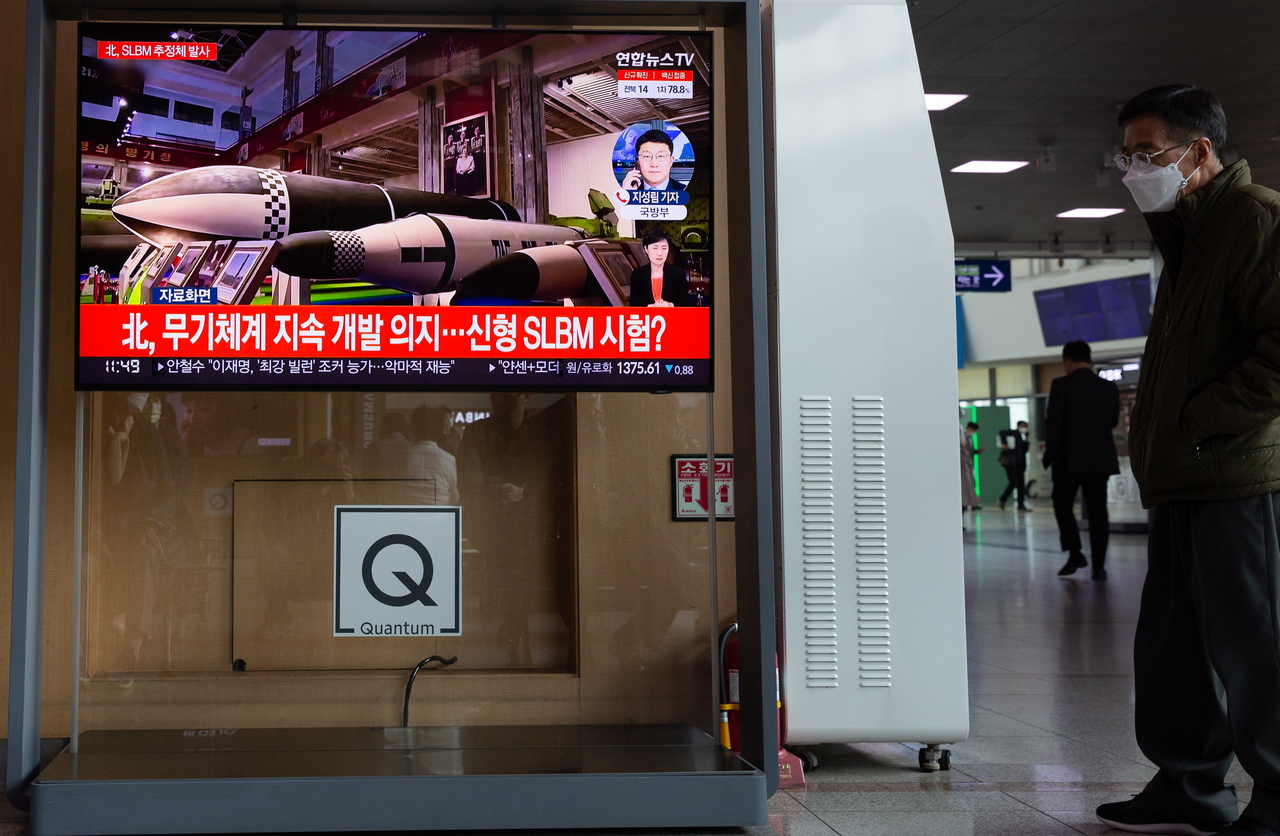North Korea fires missile amid growing pace of talks aimed at resuming dialogue
Sign up now: Get insights on Asia's fast-moving developments

A man stands near a TV screen showing a news program reporting on North Korea's latest missile launch with file footage at a station in Seoul on Oct 19, 2021.
PHOTO: EPA-EFE
SEOUL - North Korea launched a suspected ballistic missile from a submarine on Tuesday (Oct 19), amid a flurry of Seoul-led discussions aimed at resuming nuclear talks.
The United States Indo-Pacific Command urged the North to "refrain from any further destabilising acts". China called on relevant countries to "think from a broad perspective, maintain restraint and make efforts to safeguard peace and stability on the Korean peninsula".
South Korea's National Security Council expressed "deep regret" that the launch occurred while active negotiations were underway and "urged North Korea to come forward for dialogue" at an early date".
Japanese Prime Minister Fumio Kishida said two ballistic missiles were detected and called the spate of launches since last month "extremely regrettable".
South Korea's military, however, reported just one missile launched from waters near Sinpo, a port city along the east coast where North Korea is known to be building a 3,200-tonne submarine that can operate submarine-launched ballistic missiles (SLBMs).
Tuesday's missile could be a new mini SLBM displayed at North Korea's defence exhibition a week ago, officials said. It is believed to be fired from a small submarine to avoid detection and flew about 590km into the waters separating Japan and the two Koreas.
This marks the regime's eighth major weapons test this year, which experts attributed to North Korean leader Kim Jong Un's promise to keep up with South Korea's missile development.
It is not necessarily a show of strength, experts said.
Associate professor of international studies Leif-Eric Easley at Ewha Womans University said: "The Kim regime is developing SLBMs because it wants a more survivable nuclear deterrent able to blackmail its neighbours and the United States."
"There's also an element of Pyongyang racing to keep up with Seoul as South Korea has recently tested an SLBM of its own and is planning an ambitious space launch this week. North Korea's SLBM is probably far from being operationally deployed with a nuclear warhead, but Kim cannot politically afford appearing to fall behind in a regional arms race," he added.
Dr Cheong Seong-chang of Sejong Institute expects more weapons tests until February next year, when the Winter Olympics hosted by Beijing could provide a new platform for peace talks.
"That's when Kim Jong-un would most likely return to offering half-hearted peace overtures to the outside world on the sidelines of the Olympics," Dr Cheong told the Korea Herald newspaper.
He added that Mr Kim "knows how to work the event to his advantage", referring to how the leader used the 2018 Winter Games hosted by South Korea to initiate an inter-Korean summit that eventually led to dialogue with the US.
Trilateral talks among the nuclear envoys of the US, Japan and South Korea have accelerated since South Korean President Moon Jae-in in September pushed for an "end of war declaration" in hopes of restarting US-North Korea talks that stalled in 2019. The proposal earned a nod from Mr Kim.

US Special Representative for North Korea Policy Sung Kim (left) speak to reporters outside of the State Department in Washington on Oct 18, 2021.
PHOTO: AFP
US Special Representative for North Korea Policy Sung Kim reiterated on Monday that the US remains open to dialogue without preconditions, while keeping sanctions in place.
He had in-depth talks on Monday with his South Korean counterpart Noh Kyu-duk in Washington about the end-of-war proposal, ahead of a meeting with their Japanese counterpart Takehiro Funakoshi. The trio is slated to meet again later this week in Seoul.
Dr Hong Hyun-ik, head of the Korea National Diplomatic Academy, said Seoul can play an active role to persuade the US to agree to the end-of-war declaration. This would officially end the 1950-53 Korean War, which was halted by a truce agreement.
"It is time for us to seriously consider partially lifting sanctions to bring back North Korea to the negotiating table," Dr Hong said in a commentary.
"Negotiations must also seek to completely restore the Korean peninsula peace process... by guaranteeing the security of the North Korean regime and offering economic aid such as long-term interest-free development fund."


